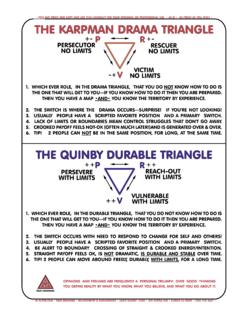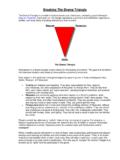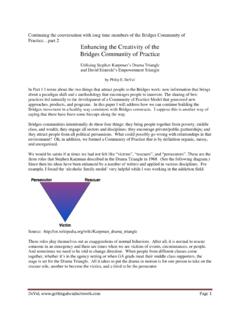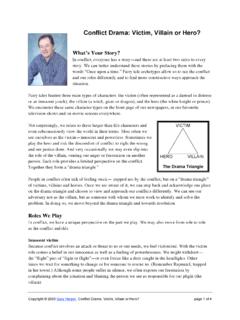Transcription of The Drama Triangle Games - Larry Fritzlan
1 RS Drama Triangle Games The Drama Triangle Games The following are " Games " that individuals often play in dysfunctional systems. These styles of relating are very common in codependent, enmeshed, or poorly differentiated families. Most individuals will be defensive if their " Games " are pointed out. The purpose of family counseling is to raise the awareness of each family member to the point that they stop playing the following three Games . They then come to the wonderful awareness that they are 100% responsible for their own lives and can choose to simply stop playing the game. Victim Rescuer Persecutor Victim The person who is treated as, or accepts the role of, and takes no responsibility for actions or feelings.
2 Discounts capabilities: There s nothing I can do. I m not strong enough. Everyone s against me. Places the majority of responsibility for success and failure on others. Complains about all the reasons why something can t be done. Often plays the yes, but .. game. When you suggest a change, the victim will agree it is a good idea, but it won t work for me. The Pathetic Victim: Poor me. Or, I just don t know how this happened. The Angry Victim: pretends to be powerful, but denies responsibility. Look what you ve done to me! Predominant feelings are helplessness and hopelessness. Victims consciously or unconsciously use blame and guilt to manipulate others into doing what they want. Victims hook up with people they can blame for their sorry state of affairs.
3 Rescuer Intervenes out of an ostensible wish to help the situation or the victim. Discounts the ability of others to solve their own problems. The proverbial knight in shining armor, selflessly putting his or her needs aside to aid another. Feeds victims with information they want to hear: I know it s not your fault. Things will get better, just wait and see. Has few boundaries and presumes others cannot survive without him or her. Rescuers believe, often subconsciously, that they are saints and martyrs, acting unselfishly for the good of others. This lofty position can create a high which makes the rescuer position addictive and all-encompassing. The main message they send to others: You are inept. You can t take care of yourself.
4 You re not good enough. Therefore, I will be in charge and take care of you. May see self as a rescue-martyr and end up as a victim-martyr. Separates others who are in conflict rather then bringing them together to resolve conflict. Predominant feeling is guilt. Persecutor Plays the bad guy; pressures, coerces or persecutes the victim. Acts largely out of anger and rage. By criticizing, demeaning and discounting others, the persecutor sets the other two positions in motion. The victim abdicates responsibility for what is wrong and the rescuer tries in vain to fix it. Maintains control by playing off the helplessness of the victim or the guilt of the rescuer. This ploy strengthens their control, which generates a feeling of omnipotence not unlike the high the rescuer gets from aiding and abetting the victim s hopelessness.
5 Criticizes others without giving guidance about how to improve. Tends to remind others of their past mistakes. Predominant feeling is anger. d d









